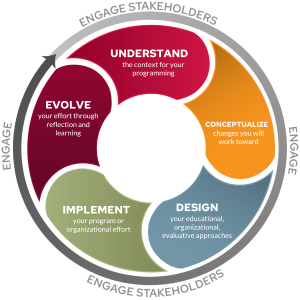
Program design includes planning for the learning environment and experience through conceptualizing change and selecting program activities to bring about desired results.
Program design fits into the “Conceptualize Change” and “Design” sections of Extension’s Framework for Ongoing Program Development.
Conceptualizing Change
Program Logic
Program logic is a way to describe the “logic”, or reasoning, behind the programs you design and deliver. The essence of program logic is to articulate the change you are trying to achieve through your programming efforts, as well as describing how you selected the activities that might achieve that change.
The key is to explicitly articulate the connections between what you do and the change you are seeking to achieve.
This brief video provides an overview of program logic as applied to Extension programs.
Logic Model
Logic models are a popular tool for linking program activities to outcomes. Logic models are strongest when they can ground your program’s theory of change in other related scholarship or past evidence.
Resources
- Logic Model Graphic (PDF)
- This Interactive Logic Model Course provides an introduction and practice to logic model development and use.
- Developing a logic model: Teaching and training guide (PDF)
Logic Model Templates
Logic Model Examples
- Reducing Underage Drinking – Prepared by Annie Lisowski, 4-H Youth Development Educator
- Technology and Safety – Prepared by Annie Lisowski, 4-H Youth Development Educator
- Community Nutrition Education Program
- Local Evaluation Project
- Developing Youth Leaders – Prepared by Jessica Jens, 4-H Youth Development Educator
- Teaching about the Environment – Prepared by Jessica Jens, 4-H Youth Development Educator
- 4-H Club Leadership – Prepared by Jessica Jens, 4-H Youth Development Educator
- Comprehensive parent education and support initiative
- Water Quality Program
- Water Quality Program with Evaluation Questions and Indicators
- Reducing and Preventing Youth Tobacco Use
Instructional Design
Program activities should be selected based on who our learners or participants are, our understanding of the need or context, ideas we want to share, or skills we want to foster.
- Map Activate Check (MAC) – Educational activities are used to activate intentional learning of concepts on the part of students. Use activities as part of MAC: M=map the lesson/mental model A=activate student learning C=check for understanding.
- The Whole Measures Guide presents a values-based framework that offers resources and guidance for conceptualizing, implementing and evaluating change efforts. The Community Food Systems Team at UW-Extension has engaged this approach.
- Natural Circles of Support (NCoS) is an approach to bring about change with that is being used in schools and communities throughout Wisconsin and beyond, with a focus on urban communities.